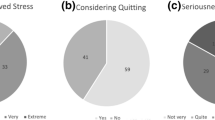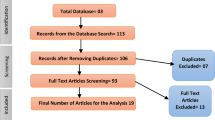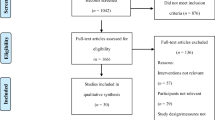Abstract
Burnout, an occupational syndrome characterized by feelings of emotional exhaustion, depersonalization, and diminished personal accomplishment, is highly prevalent among police officers, perhaps as a result of regular and repeated exposure to job-related stressful events. Burnout might be especially problematic for officers working with sexual assault victims, as this sensitive work requires officers to be exposed to trauma while conducting trauma-informed, victim-centered investigations. The current study used interagency, multidisciplinary collaboration and a mixed-method design to examine professional self-care as a mechanism to combat burnout among police officers (n = 331) at a Sexual Assault Kit Initiative (SAKI) site in the southeastern region of the United States. Professional self-care better predicted each component of burnout than did exposure to job-related trauma, being injured on-duty, number of critical incident types experienced, and years on the force. Specifically, engagement in professional development activities best predicted reduced emotional exhaustion and depersonalization of victims. Officers’ qualitative responses supported quantitative survey data, with 48% requesting an increase in professional self-care opportunities (e.g., more trainings, professional support) offered by their organization. Although the nature of policing often precludes a route to reducing officers’ exposure to job-related stressful events, findings suggest that law enforcement organizations can positively impact officer burnout by enhancing professional self-care and broadly providing critical professional development experiences.
Similar content being viewed by others
References
Anshel MH (2000) A conceptual model and implications for coping with stressful events in police work. Crim Justice Behav 27(3):375–400. https://doi.org/10.1177/0093854800027003006
Aranda-Beltrán C, Pando-Moreno M, Salazar-Estrada JG, Torres-López TM, Aldrete-Rodríguez MG (2009) Social support, burnout syndrome, and occupational exhaustion among Mexican traffic police officers. Span J Psychol 12(2):585–592. https://doi.org/10.1017/s1138741600001955
Asen J, Colon I (1995) Acceptance and use of police department employee assistance programs. Employee Assistance Quarterly 11(1):45–54
Brady PQ (2017) Crimes against caring: exploring the risk of secondary traumatic stress, burnout, and compassion satisfaction among child exploitation investigators. J Police Crim Psychol 32(4):305–318. https://doi.org/10.1007/s11896-016-9223-8
Bureau of Justice Assistance (2019) Over 47,000 kits tested through BJA’s Sexual Assault Kit Initiative since 2015. Retreived from https://bja.ojp.gov/feature/over-47000-kits-tested-through-bjas-sexual-assault-kit-initiative-2015
Burke RJ (1994) Stressful events, work-family conflict, coping, psychological burnout, and well-being among police officers. Psychol Rep 75:787–800. https://doi.org/10.2466/pr0.1994.75.2.787
Burke RJ (2017) Burnout in police work: sources, consequences, and remedies. In: Burke RJ (ed) Stress in policing: Sources, consequence, and interventions. Routledge, New York, NY, pp 153–169
Burke R, Mikkelsen A (2006) Burnout, job stress and attitudes towards the use of force by Norwegian police officers. Policing: An International Journal, 28(2):269-278. https://doi.org/10.1108/13639510510597906
Campbell BA, Menaker T, King W (2015) The determination of victim credibility by adult and juvenile sexual assault investigators. J Crim Just 43:29–29. https://doi.org/10.1016/j.crimjus.2014.12.001
Campbell R, Feeney H, Fehler-Cabral G, Shaw J, Horsford S (2017) The national problem of untested sexual assault kits (SAKs): scope, causes, and future directions for research, policy, and practice. Trauma, Violence, and Abuse 18(4):363–376. https://doi.org/10.1177/1524838015622436
Campbell R, Fehler-Cabral G, Bybee D, Shaw J (2017) Forgotten evidence: a mixed methods study of why sexual assault kits (SAKs) are not submitted for DNA forensic testing. Law Hum Behav 41(5):454–467. https://doi.org/10.1037/lhb0000252
Campbell R, Fehler-Cabral G, Pierce S, Sharma D, Bybee D, Shaw J, Horsford S, Feeney H (2015) The Detroit sexual assault kit (SAK) action research project (ARP). U.S, Department of Justice
Campbell R, Shaw J, Fehler-Cabral G (2015) Shelving justice: the discovery of thousands of untested rape kits in Detroit. City Community 14(2):151–165. https://doi.org/10.1111/cico.12108
Cieslak R, Shoji K, Douglas A, Melville E, Luszczynska A, Benight CC (2014) A meta-analysis of the relationship between job burnout and secondary traumatic stress among workers with indirect exposure to trauma. Psychol Serv 11(1):75–86. https://doi.org/10.1177/1098611115604448
Crown Prosecution Service (2014) Violence against women and girls crime report 2013-2014. Retrieved from http://www.cps.gov.uk/publications/equality/vaw/
de la Fuente-Solana EI, Aguayo-Extremera R, Vargas-Pecino C, Cañadas-de la Fuente GR (2013) Prevalence and risk factors of burnout syndrome among Spanish police officers. Psicothema 25(4):488–493. https://doi.org/10.7334/psicothema2013.81
Donnelly E, Valentine C, Oehme K (2015) Law enforcement officers and employee assistant programs. Policing: An International Journal of Police Strategies & Management, 38(2), 206-220
Dorociak KE (2015) Development of the Personal and Professional Self-Care Scale. Master’s Theses, Paper, p 3130
Dorociak KE, Rupert PA, Bryant FB, Zahniser E (2017) Development of the Professional Self-Care Scale. J Couns Psychol 64(3):325–334. https://doi.org/10.1037/cou0000206
Doulougari K, Georganta K, Montgomery A (2016) “Diagnosing” burnout among healthcare professionals: can we find consensus? Cogent Medicine 3(1):1–10. https://doi.org/10.1080/2331205X.2016.1237605
Duran F, Woodhams J, Bishopp D (2019) An interview study of the experience of police officers in regard to psychological contract and wellbeing. J Police Crim Psychol 34:184–198. https://doi.org/10.1007/s11896-018-9275-z
Elliott DE, Bjelajac P, Fallot RD, Markoff LS, Reed BG (2005) Trauma-informed or trauma-denied: principles and implementation of trauma-informed services for women. J Community Psychol 33(4):461–477 https://doi.org/10.1002/jcop.20063
Federal Bureau of Investigation (2016) 2016 crime in the United States. U.S. Department of Justice, Federal Bureau of Investigation, Criminal Justice Information Services Division
Fyhn T, Fjell KK, Johnsen BH (2016) Resilience factors among police investigators: hardiness-commitment a unique contributor. J Police Crim Psychol 31:261–269. https://doi.org/10.1007/s11896-015-9181-6
Grant HB, Lavery CF, Decarlo J (2018) An exploratory study of police officers: Low compassion satisfaction and compassion fatigue. Front Psychol 9:2793. https://doi.org/10.3380/fpsyg.2018.02793
Grauwiler P, Barocas B, Mills LG (2008) Police peer support programs: Current knowledge and practice. Int J Emerg Ment Health 10(1):27–38
Greeson MR, Campbell R, Fehler-Cabral G (2016) “Nobody deserves this”: adolescent sexual assault victims’ perceptions of disbelief and victim blame from police. J Community Psychol 44(1):90–110. https://doi.org/10.1002/jcop.21744
Hartley TA, Sarkisian K, Violanti JM, Andrew ME, Burchfiel CM (2013) PTSD symptoms among police officers: associations with frequency, recency, and types of traumatic events. Int J Emerg Ment Health 15(4):241–253. https://doi.org/10.1177/0032258X18761284
Hinderer KA, VonRueden KT, Friedmann E, McQuillan KA, Gilmore R, Murray M (2014) Burnout, compassion fatigue, compassion satisfaction, and secondary traumatic stress in trauma nurses. J Trauma Nurs 21(4):160–169. https://doi.org/10.1097/JTN.0000000000000055
Kaufmann CN, Rutkow L, Spira AP, Mojtabai R (2013) Mental health of protective services workers: results from the National Epidemiologic Survey on Alcohol and Related Conditions. Disaster Med Public Health Prep 7:36–45. https://doi.org/10.1001/dmp.2012.55
Karaffa KM, Koch JM (2015) Stigma, pluralistic ignorance, and attitudes toward seeking mental health services among police officers. Crim Justice Behav 43(6):759–777. https://doi.org/10.1177/0093854815613103
Kervick C, Kelly M (2018) State of Delaware Sexual Assault Kit Initiative Policy. Criminal Justice Council
Killian KD (2008) Helping till it hurts? A multimethod study of compassion fatigue, burnout, and self-care in clinicians working with trauma survivors. Traumatology 14(2):32–44. https://doi.org/10.1177/1534765608319083
Kop N, Euwema M (2001) Occupational stress and the use of force by Dutch police officers. Crim Justice Behav 28(5):631–652. https://doi.org/10.1177/009385480102800505
Kop N, Euwema M, Schaufeli W (1999) Burnout, job stress and violent behavior among Dutch police officers. An International Journal of Work, Health, and Organisations 13(4):326–340. https://doi.org/10.1080/02678379950019789
Korre M, Farioli A, Varvarigou V, Sato S, Kales SN (2014) A survey of stress levels and time spent across law enforcement duties: Police chief and officer agreement. Policing: A Journal of Policy and Practice 8(2):109-122. https://doi.org/10.1093/police/pau001
Lambert EG, Qureshi H, Frank J, Klahm C, Smith B (2018) Job stress, job involvement, job satisfaction, and organizational commitment and their associations with job burnout among Indian police officers: a research note. J Police Crim Psychol 33:85–99. https://doi.org/10.1007/s11896-017-9236-y
Lathan E, Langhinrichsen-Rohling J, Duncan J, Stefurak JT (2019) The promise initiative: promoting a trauma-informed police response to sexual assault in a mid-size southern community. J Community Psychol 47(1):1733–1749. https://doi.org/10.1002/jcop.22223
Liu H, Petukhova MV, Sampson NA (2017) Association of DSM-IV posttraumatic stress disorder with traumatic experience type and history in the World Health Organization World Mental Health Surveys. Journal of the American Medical Association Psychiatry 74(3):270–281. https://doi.org/10.1001/jamapsychiatry.2016.3783
Lovell R, Luminais M, Flannery DJ, Bell R, Kyker B (2018) Describing the process and quantifying the outcomes of the Cuyahoga County sexual assault kit initiative. J Crim Just 57:106–115. https://doi.org/10.1016/j.jcrimjus.2018.05.012
Maddox L, Lee D, Barker C (2011) Police empathy and victim PTSD as potential factors in rape case attrition. J Police Crim Psychol 26(2):112–117. https://doi.org/10.1007/s11896-010-9075-6
Maguen S, Metzler TJ, McCaslin SE, Inslicht SS, Henn-Haase C, Marmar CR (2009) Routine work environment stress and PTSD symptoms in police officers. J Nerv Ment Dis 197(10):754–760. https://doi.org/10.1097/NMD.0b013e3181b975f8
Marchand A, Boyer R, Nadeau C, Martin M (2013) Predictors of Posttraumatic Stress Disorder in police officers: A prospective study. Institut de recherche Robert-Sauve, Special Report, Studies and Research Projects, Report R-786
Martinussen M, Richardsen AM, Burke RJ (2007) Job demands, job resources, and burnout among police officers. J Crim Just 35(3):239–249. https://doi.org/10.1016/j.crimjus.2007.03.001
Maslach CS, Jackson SE (1981) The measurement of experienced burnout. J Organ Behav 2(2):99–113. https://doi.org/10.1002/job.4030020205
Maslach CS, Jackson SE, Leiter MP (1996) MBI: Maslach Burnout Inventory: CPP, Incorporated Sunnyvale (CA)
Maslach CS, Leiter MP (1997) The truth about burnout: how organizations cause personal stress and what to do about it. Jossey-Bass, San Francisco, CA
Maslach CS, Leiter MP (2016) Understanding the burnout experience: recent research and its implications for psychiatry. World Psychiatry 15(2):103–111
Maslach CS, Schaufeli WB, Leiter MP (2001) Job burnout. Annu Rev Psychol 52:397–422. https://doi.org/10.1146/annurev.psych.52.1.397
McCartney S, Parent R (2015) Ethics in Law Enforcement. B.C. Campus, Victoria, BC
McCarty WP, Aldirawi H, Dewald S, Palacios M (2019) Burnout in blue: an analysis of the extent and primary predictors of burnout among law enforcement officers in the United States. Policy Q 22(3):278–304. https://doi.org/10.1177/1098611119828038
National Institute of Justice (2017) National best practice for sexual assault kits: A multidisciplinary approach. Washington, D.C.: U.S. Department of Justice, Office of Justice Programs, National Institute of Justice
Patterson D (2011) The impact of detectives’ manner of questioning on rape victims’ disclosure. Violence Against Women 26:3618–3639. https://doi.org/10.1177/1077801211434725
Patterson GT (2001) Reconceptualizing traumatic incidents experienced by law enforcement personnel. Australasian Journal of Disaster and Trauma Studies 5(2)
Perez LM, Jones J, Emglert DR, Sachau D (2010) Secondary traumatic stress and burnout among law enforcement investigators exposed to disturbing media images. J Police Crim Psychol 25(2):113–124. https://doi.org/10.1007/s11896-010-9066-7
Salters-Pedneault K, Ruef AM, Orr SP (2010) Personality and psychophysiological profiles of police officer and firefighter recruits. Personal Individ Differ 49:210–215. https://doi.org/10.1016/j.paid.2010.03.037
SAMHSA (2014) SAMHSA’s Concept of Trauma and Guidance for a Trauma-Informed Approach. HHS Publication No. (SMA) 14-4884. Rockville, MD: Substance Abuse and Mental Health Services Administration
Schaible L, Six M (2016) Emotional strategies of police and their varying consequences for burnout. Policy Q 19(1):3–31. https://doi.org/10.1177/1098611115604448
Stanley IH, Horn MA, Joiner TE (2016) A systematic review of suicidal thoughts and behaviors among police officers, firefighters, EMTs and paramedics. Clin Psychol Rev 44:25–44. https://doi.org/10.1016/j.cpr.2015.12.002
Turgoose D, Glover N, Barker C, Maddox L (2017) Empathy, compassion fatigue, and burnout in police officers working with rape victims. Traumatology 23(2):205–213. https://doi.org/10.1037/trm0000118
U.S. Bureau of Labor Statistics (2016) Injuries, Illnesses, and Fatalities. Retrieved from https://www.bls.gov/iif/oshwc/cfoi/police-officers-2014.htm#1
U.S. Census Bureau. (2019). QuickFacts: Mobile City, Alabama; Mobile County, Alabama. https://www.census.gov/quickfacts/fact/table/mobilecityalabama,mobilecountyalabama/PST045219
Vanhuele S, Declercq F, Meganck R, Desmet M (2008) Burnout, critical incidents, and social support in security guards. Stress Health 24:137–141. https://doi.org/10.1002/smi.1177
Varvarigou V, Farioli A, Korre M, Sato S, Dahabreh IJ, Kales SN (2014) Law enforcement duties and sudden cardiac death among police officers in United States: case distribution study. The BMJ 18:1–9. https://doi.org/10.1136/bmj.g6534
Vuorensyrjä M, Mälkiä M (2011) Nonlinearity of the effects of police stressors on police officer burnout. Policing An International Journal of Police Strategies and Management 34(3):382–402. https://doi.org/10.1108/13639511111157474
Wells W, Campbell B, Franklin C (2016) Unsubmitted sexual assault kits in Houston, TX: Case characteristics, forensic testing, results, and the investigation of CODIS hits, final report. U.S. Department of Justice
Wolter C, Maria AS, Wörfel F, Gusy B, Lesener T, Kleiber D, Renneberg B (2019) Job demands, job resources, and well-being in police officers - a resource-oriented approach. J Police Crim Psychol 34:45–54. https://doi.org/10.1007/s11896-018-9265-1
Funding
This project was supported by Grant No. 2017-AK-BX-0006 awarded by the Bureau of Justice Assistance to City of Mobile Police Department and Jennifer Langhinrichsen-Rohling, Ph.D. [Principal Investigators]. The Bureau of Justice Assistance is a component of the Department of Justice’s Office of Justice Programs, which also includes the Bureau of Justice Statistics, the National Institute of Justice, the Office of Juvenile Justice and Delinquency Prevention, the Office for Victims of Crime, and the SMART Office. Points of view or opinions in this document are those of the author and do not necessarily represent the official position or policies of the U.S. Department of Justice.
Author information
Authors and Affiliations
Corresponding author
Ethics declarations
Conflict of Interest
The authors declare that they have no conflict of interest.
Ethical Approval
The study was approved by the University of South Alabama Institutional Review Board. All procedures performed in studies involving human participants were in accordance with the ethical standards of the institutional and/or national research committee and with the 1964 Helsinki declaration and its later amendments or comparable ethical standards.
Informed Consent
Informed consent was obtained from all individual participants included in the study.
Additional information
Publisher’s Note
Springer Nature remains neutral with regard to jurisdictional claims in published maps and institutional affiliations.
Rights and permissions
About this article
Cite this article
Lathan, E.C., Langhinrichsen-Rohling, J., Stefurak, J.“. et al. Using Collaborative, Mixed-Methods Research to Determine Professional Self-care’s Relation to Burnout Among Police Officers at a Sexual Assault Kit Initiative Site. J Police Crim Psych 36, 423–435 (2021). https://doi.org/10.1007/s11896-020-09423-w
Accepted:
Published:
Issue Date:
DOI: https://doi.org/10.1007/s11896-020-09423-w




